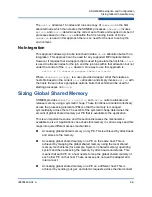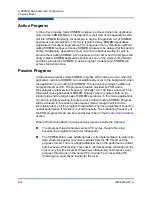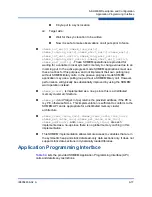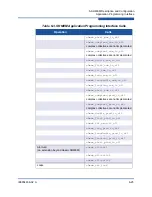
6
–
SHMEM Description and Configuration
Sizing Global Shared Memory
6-10
IB0054606-02 A
The QLogic SHMEM library pre-allocates room in the virtual address space
according to
$SHMEM_SHMALLOC_MAX_SIZE
(default of 4GB). It then populates
this with enough pages to cover
$SHMEM_SHMALLOC_INIT_SIZE
(default
16MB). The global shared memory segment can then grow dynamically from its
initial size up to its maximum size. If an allocation attempts to exceed the
maximum size allocations are no longer guaranteed to succeed, and will fail if
there is no room in the virtual memory space of the process following the global
shared memory segment. Upon failure the call to
shmalloc
or
shrealloc
returns NULL. The only down-side of using a large maximum size is occupancy of
virtual address space (48 bits for 64-bit processes is very plentiful), and set-up of
page table entries by the OS. A reasonable limit is 4GB per process. One
side-effect of this approach is that SHMEM programs consume a large amount of
virtual memory when viewed with the "top" program. This is due to the large
maximum size setting. The
RES
field of
top
indicates the actual amount of
memory that is resident in memory (for example, in actual use).
If a SHMEM application program runs out of global shared memory, increase the
value of
$SHMEM_SHMALLOC_MAX_SIZE
. The value of
$SHMEM_SHMALLOC_INIT_SIZE
can also be changed to pre-allocate more
memory up front rather than dynamically.
By default QLogic SHMEM will use the same base address for the symmetric
heap across all PEs in the job. This address can be changed using the
$SHMEM_SHMALLOC_BASE_ADDR
environment variable. It will be rounded up to
the nearest multiple of the page size. The virtual address range specified by this
base address and the maximum size must not clash with any other memory
mapping. If any SHMEM process in a job has a memory mapping clash, the
QLogic SHMEM library will fail during
shmem_init()
. With 64-bit programs, a
large virtual address space (for example, 48 bits in many modern processors) and
a reasonably homogeneous cluster, it is expected that such failures will be rare.
The default value of
$SHMEM_SHMALLOC_BASE_ADDR
has been chosen to work
on the supported distributions and processors. In the rare event of a failure, the
value of
$SHMEM_SHMALLOC_BASE_ADDR
can be changed using the
environment variable.
NOTE
There is a connection between the sizing of the global shared memory and
local shared memory because of the mechanism used for accessing global
shared memory in a PE that happens to be on the same host.
Summary of Contents for OFED+ Host
Page 1: ...IB0054606 02 A OFED Host Software Release 1 5 4 User Guide...
Page 14: ...xiv IB0054606 02 A OFED Host Software Release 1 5 4 User Guide...
Page 22: ...1 Introduction Interoperability 1 4 IB0054606 02 A...
Page 96: ...4 Running MPI on QLogic Adapters Debugging MPI Programs 4 24 IB0054606 02 A...
Page 140: ...6 SHMEM Description and Configuration SHMEM Benchmark Programs 6 32 IB0054606 02 A...
Page 148: ...8 Dispersive Routing 8 4 IB0054606 02 A...
Page 164: ...9 gPXE HTTP Boot Setup 9 16 IB0054606 02 A...
Page 176: ...A Benchmark Programs Benchmark 3 Messaging Rate Microbenchmarks A 12 IB0054606 02 A...
Page 202: ...B SRP Configuration OFED SRP Configuration B 26 IB0054606 02 A Notes...
Page 206: ...C Integration with a Batch Queuing System Clean up PSM Shared Memory Files C 4 IB0054606 02 A...
Page 238: ...E ULP Troubleshooting Troubleshooting SRP Issues E 20 IB0054606 02 A...
Page 242: ...F Write Combining Verify Write Combining is Working F 4 IB0054606 02 A Notes...
Page 280: ...G Commands and Files Summary of Configuration Files G 38 IB0054606 02 A...
Page 283: ......
















































